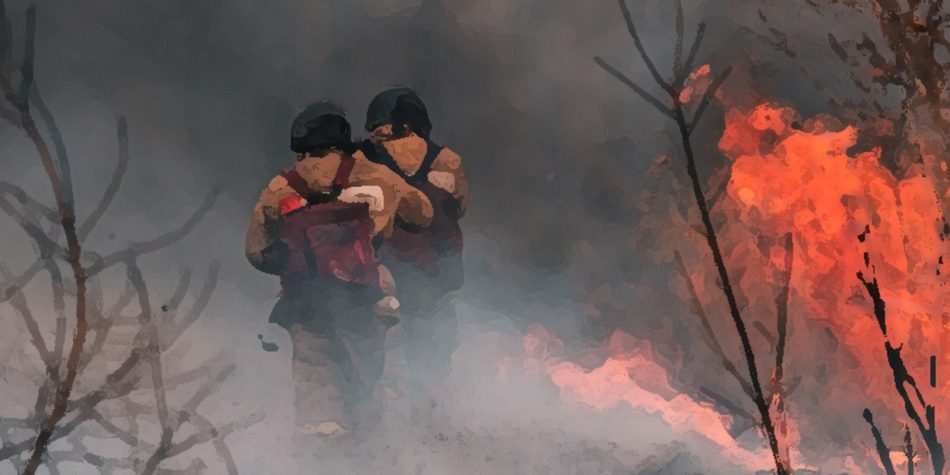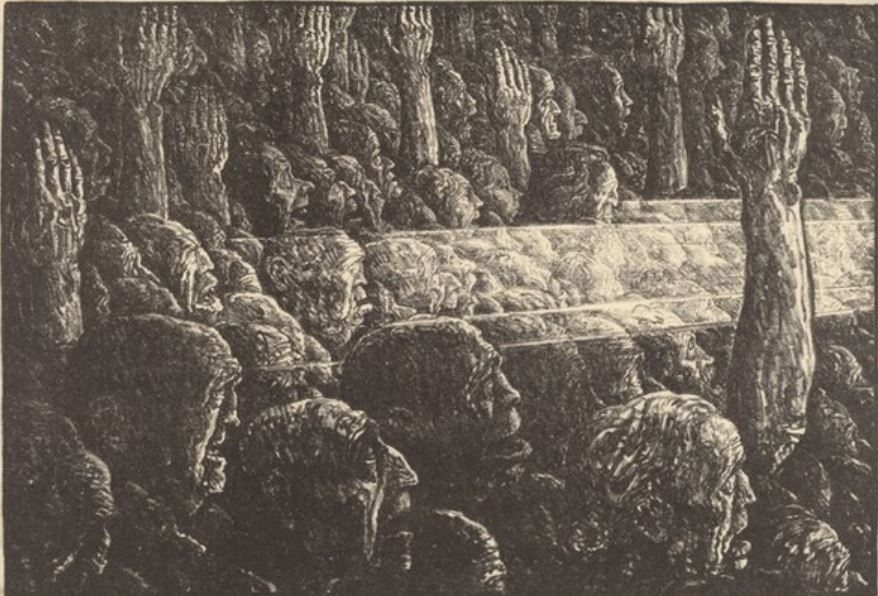Against the backdrop of ominous fires ravaging California (in the same month as ferocious storms batter the gulf coast) presidential candidate Joe Biden recently raised concern that for millions of Americans who “live in the shadow of an orange sky” it has gotten so bad they “are left asking: Is doomsday here?”
Years ago, soon after the devastating typhoons that hit the Philippines, one of us asked a friend who had distanced himself from faith in prior years, “do you see in any of these natural disasters any biblical signs of the times?”
“Of course not,” he answered quickly. “All this is just climate change.”
For him—and many others—climate change has become the only explanation necessary for unsettling environmental patterns we see around us on a regular basis.
In recent decades, climate change has been discussed as contributing to a wide scope of problems we are witnessing. This includes a worsening of hurricanes, vulnerable bird populations, a dramatic drop in insect numbers, and even rising suicides and an accelerating rate of infectious disease.
Without denying the reality of environmental disturbances and changes around us, Christians raise a message that offers to broaden the conversation a little—and maybe even inject new hope.
Jesus Himself drew attention to environmental turbulence in answering his apostles’ question about the “sign of [His] coming”—specifically prophesying that “there shall be famines, and pestilences, and earthquakes, in divers places.”
Why, though, would we spend any time paying attention to scriptures like this or associated speculation about “last days”? Why do any of this, when another explanation steeped in scientific sophistication is available?
This is arguably no time for distraction. And some have raised understandable worries that any such divine consideration could become an excuse for not making any changes in how we act. That would be unfortunate for a people who appreciate the Biblical dictate by God entrusting them as stewards over creation. If and when we point to God’s power as an excuse to not exercise our own, we agree that is problematic.
In recent years, however, the warnings about climate change have become dire enough—stark enough—that they have started to feel reminiscent of the apocalyptic voices among us who anticipate the second coming of Christ. At a summit last year, Alexandria Ocasio-Cortez went so far as to say, “the world is going to end in 12 years if we don’t address climate change.” While some would caution AOC on the specificity of her dire fears, her commentary is not anomalous when considering the way many people are talking today.
In her TED talk, Joan Blades called climate change “a progressive ‘end times’ story.” In the most recent New York Times article surveying the threats of climate change, the authors conclude fundamental shifts in the world atmosphere are “irretrievably baked in…cannot be reversed” and that there is “no going back”—all reflecting “a price to be paid” for our inaction. To sum up their grim forecast, these reporters conclude, “our choices now range from merely awful to incomprehensibly horrible.”
Wow.
Let’s be clear: many believers do share these concerns about environmental conditions around us. And it would be a mistake to believe that questioning the prevailing narrative of climate change means rejecting the existence of measurable shifts in the earth’s climate, or an influence that may come from human activity.
Do you notice who has central power to shape the climate in this narrative?
In fact, there are references in the Bible itself warning of excessive heat—and not just in the famines of ancient Egypt. In the quintessential apocalyptic vision of that mighty text, the ancient apostle John envisioned a curse poured out on the earth centering specifically on the sun—“and it was given power to scorch the people with fire. And the people were scorched by intense (“fierce”) heat, and they cursed the name of God, who had authority (“power” or “control”) over these plagues; yet they did not repent and give Him glory” (Revelation 16: 8-9).
In contrast to a commentary surrounding us today, notice who has central power to shape the climate in this narrative. While, yes, the text does highlight human influence (“repent”), it’s hard to interpret that as centering entirely on reducing emissions and our collective “carbon footprint.”
At the same time, it’s also not hard to imagine environmental degradation and excessive pollution not being a concern to God and among the betrayals we are called to repent of. Moroni himself spoke in the Book of Mormon of “great pollutions upon the face of the earth” as one sign of the last days. Scriptural definitions of “pollution,” though, clearly go well beyond the more limited understanding in our secular discourse—with Jeremiah, for instance, warning the people anciently, “thou hast polluted the land with thy whoredoms and with thy wickedness.”
Part of the Christian message that may be hard for people to understand is that these kinds of choices in how we treat each other also impact the extent of “commotion” in the larger physical atmosphere around us.
But how – or why? Because we understand the earth is a living thing—as in, having a spirit itself—and therefore, attentive to the actions of inhabitants on her. In a text Latter-day Saints embrace as additional scripture, the ancient prophet Enoch hears a “voice from the bowels” of the earth saying this:
Wo, wo is me, the mother of men; I am pained, I am weary, because of the wickedness of my children. When shall I rest, and be cleansed from the filthiness which is gone forth out of me? When will my Creator sanctify me, that I may rest, and righteousness for a season abide upon my face?
Enoch is moved to tears by this, and cries out, “O Lord, wilt thou not have compassion upon the earth?…. When shall the earth rest?”
This ancient prophet felt deep sorrow in witnessing the earth’s pain. Maybe rather than being so quick to dismiss environmental concerns in a partisan atmosphere today, we should as well?
Surely, rest will come to our precious planet one day. But not yet.
For now, the earth continues to be pained by the whole array of human action that is brutal, cruel, vicious, dishonest, degrading, harsh, and abusive. There’s way too much of that all around us. And believers see all of this as playing a role of some of the commotion we’re seeing around us environmentally.
In a book popular among Latter-day Saints, the main protagonist Spencer describes evil and lies spreading across earth as a “blanket of darkness…dimming the light of Christ that reaches the earth.” Like a “tropical flower that had been moved into a basement devoid of all light and dying in the darkness,” this is why the earth was “suffering” and “could not live without the light that gave light to everything and made it beautiful and useful” to humankind. As a result, “every part of the earth was in great tribulation.”
“When evil overtakes” the earth, Spencer continued (sharing glimpses of inspiration he felt were given to him), “there is a process given to the earth whereby it cleanses itself….natural disasters, plagues, and upheavals begin in random places. When evil on the world becomes so great that the light of Christ is dimmed, it will produce eruptions, extremes of weather and temperature, storms, floods, earthquakes, and other destructive events. The is a direct correlation between the choices of mortals and the conditions of the earth.”
If the earth really is suffering, then environmental stewardship does clearly matter to God. But in a different way than many people assume—a way that goes beyond only a reduction of emissions. If we’re taking scripture seriously, more is being asked of us than just that.
That may feel challenging to some in our day—but it’s a challenge Christians cannot ignore. As Jacob Hess asked in his dialogue with his atheist friend Phil Neisser, “Is the work of greatest urgency improving the physical environment or purifying one’s own soul? Should we focus more on becoming ‘clean’ or becoming ‘green’?”
What will that take—for ourselves and for the earth itself? That brings us to some of the many other references to growing heat in scripture as well. For instance, the prophet Malachi famously said, “The day cometh that shall burn as an oven” (Mal. 4:1; 3 Ne. 25:1; D&C 133:64; JS—H 1:37).
Believers associate that reference with a burning to cleanse the earth from wickedness—in a kind of “baptism” by fire to purify the planet for a day of great peace to follow.
However ominous that burning may sound, we would argue it also showcases the greatest difference between Christian and secular end-times stories. Namely, what comes after “the end.”
And what is that? Not an end to human existence! Not for believers. On the contrary, it’s everything that tears down human existence that believers anticipate coming to an end: violence, poverty, and suffering.
End-times for believers is the beginning of something far better. One of the core “Articles of Faith” articulated by Joseph Smith includes an anticipation that “the earth will be renewed and receive its paradisiacal glory.” And Isaiah himself described a day when God would “create new heavens and a new earth: and the former shall not be remembered, nor come into mind”—a day that he spoke of as involving joy and gladness for believers.
What a contrast with how people are feeling today! Indeed, in the secular end-times story, there is nothing beyond the great threat, unless it is averted.
No happy endings in that case. And no green hill beyond the bluff.
Only a planet uninhabitable for human life.
Perhaps we shouldn’t be surprised, then, to see more and more evidence of a palpable despair that vision evokes. Mother Jones reported on “climate despair”—where discussion of climate change induces “so much anxiety” that people have “considered suicide.” We’ve overheard some of our own friends despairing of life because of climate change—to the point of questioning whether they should have children or even try to keep going.
In an atmosphere where celebrities popularize the idea that “billions will die” from climate change, can you blame people for getting worked up? In 2017, the American Psychological Association diagnosed rising eco-anxiety and called it “a chronic fear of environmental doom“— with many concluding ‘It’s too late to do anything. ‘There is no future anymore.’ ‘We’re basically doomed.’ ‘We should give up.’”
And no wonder. Wouldn’t you feel that way, if you kept hearing there was no hope for our planet?
What’s more effective than fear to induce change? Hope….that better days are ahead.
If such fear were an effective tool to prompt greater action, perhaps it would be justified. But scientific studies have now documented that “fear-inducing representations of climate change” are not even effective at motivating productive engagement to improve things.
What’s more effective than fear to induce change?
Hope. Legitimate, rock-solid hope that better days are ahead.
Yes, there are real challenges we will likely have to pass through to get there—like a mother giving birth to a baby.
But then, the baby is here! That’s why, we believe, President Russell Nelson has been so intent in reminding people that good—even glorious—days are ahead.
Yes, let’s appreciate the impact of our choices in relation to the physical atmosphere around us. But let’s see in the environmental turbulence around us a wake-up call that goes beyond our carbon footprint alone—and which helps us look inside our own hearts. Our own relationships. Our own families.
And make some changes.
Yes, let’s be green. But let’s work to be clean too!
And let’s place our trust in God for our ultimate security. Then, rather than cursing the heavens in anger, we can do as the scripture says, and “cheerfully do all things that lie in our power; and then may we stand still, with the utmost assurance, to see the salvation of God, and for his arm to be revealed.”

















